Adults With PWS Have Unique Gut Bacteria
Written by |

Adults with Prader-Willi syndrome (PWS) have a unique gut bacteria composition, characterized by low levels of probiotic species and a high number of other microbes whose potential health and metabolic implications are still unknown, a study has found.
The findings indicate that people with PWS may benefit from probiotic supplements intended to improve gastrointestinal health, researchers said.
The study, “Adults with Prader–Willi syndrome exhibit a unique microbiota profile,” published in the journal BMC Research Notes.
PWS is caused by the loss of paternal genes in chromosome 15, which control metabolism, appetite, growth, intellectual abilities, and social behavior. The lack of these genes makes patients unable to control the amount of food they eat, resulting in obesity and related complications.
Previous studies have found that compared with healthy people, those with PWS may have a slower gastrointestinal transit and often experience constipation, an important factor to change gut bacteria composition.
Although prior research has found that gut bacteria composition in adults with PWS is different than that of healthy individuals of the same sex, age and body mass index (BMI, a measure of body fat), “it remains unclear as to whether the microbiota composition of individuals with PWS is characteristic of the syndrome or the environment,” the scientists wrote.
Researchers at the University of Florida and their colleagues now sought to determine if gut bacteria composition in adults with PWS differs from that of healthy individuals, regardless of their age or place of residence.
To answer this question, they compared the composition of gut bacteria found in the stool of 25 adults (mean age 34.9 years, 60% women) with a genetically confirmed diagnosis of PWS and living in Florida, to four different groups of individuals who did not have the disease.
These four groups included: 151 healthy adults living in Canada (mean age 35.2 years, 61% women); 263 individuals with irritable bowel syndrome (IBS) also living in Canada (mean age 41.8 years, 79% women: 68 young adults from Florida (mean age 23.2 years, 63% women); and 26 elder women also from Florida (mean age 73.7). Notably, IBS is a common disorder affecting the large intestine that causes abdominal pain, bloating, diarrhea, and constipation.
To assess if patients’ gut bacteria profile differed from that of all other groups regardless of age and geographical location, the investigators merged data from all five groups and then used machine-learning algorithms to try to estimate which data belonged to individuals with PWS.
They noticed that when plotted according to bacteria diversity and species’ relationships, PWS patients’ data tended to group together, instead of overlapping with that of the remaining four groups.
Also, after being “trained” to recognize patient data, the algorithms successfully distinguished gut bacteria profiles belonging to those with PWS from those of individuals of all other groups, confirming the unique gut bacteria profile in PWS.
After analyzing the results in more detail, the researchers found a higher number of bacteria belonging to the Tenericutes phyllum, as well those belonging to the genera Alistipes, Parabacteriodes and Odoribacter, compared with individuals from the remaining groups. (Phyllum and genera are terms used in bacterial taxonomy, or rank-based classification)
“The relevance of higher levels of Tenericutes in PWS adults is not known; however, the abundance of Alistipes and Parabacteroides have been negatively associated with cardiometabolic indices such as serum lipids [blood fats], blood glucose, and blood pressure,” the investigators wrote.
They also said that the relatively higher abundance of microbes belonging to the Tenericutes phyllum may be part of the unique signature that allows PWS patients’ gut bacteria composition to be easily distinguished from that of individuals without the disease.
These analyses also showed that PWS patients had lower levels of probiotic Bifidobacterium species compared with other groups, apart from that of elder women living in Florida.
“This finding was not unexpected given that suppression of Bifidobacterium has been reported in individuals with constipation and some of the adults with PWS reported slow transit stool form, suggestive of constipation,” the researchers wrote.
Considering the relatively low abundance of these beneficial bacteria, investigators argued that those with PWS may benefit from probiotic supplements.





